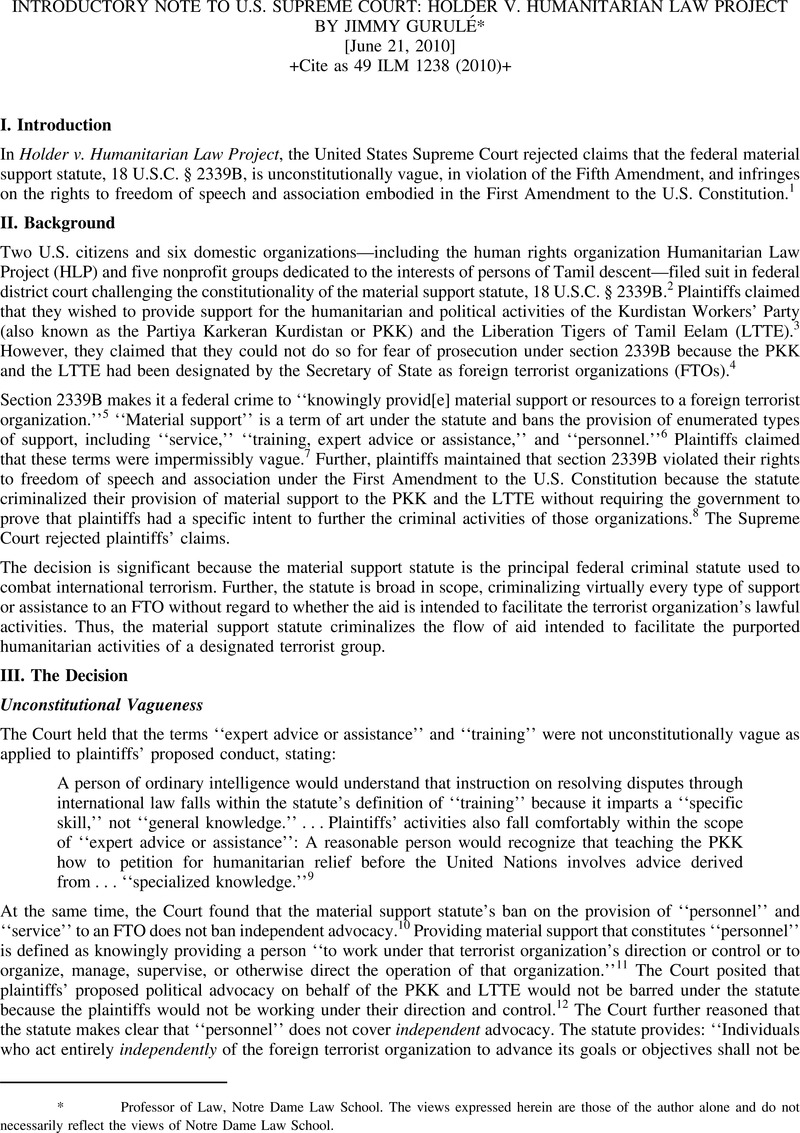Published online by Cambridge University Press: 27 February 2017

* This text was reproduced and reformatted from the text available at the U.S. Supreme Court website (visited October 6, 2010) http://www.supremecourt.gov/opinions/09pdf/08-1498.pdf.
1 Holder v. Humanitarian Law Project, 130 S. Ct. 2705 (2010).
2 Id. at 2713.
3 Id. at 2713-14. The PKK was founded in 1974 for the purpose of establishing an independent Kurdish state in southeast Turkey. Id. at 2713. The LTTE was established in 1976 for the purpose of creating an independent Tamil state in Sri Lanka. Id.
4 Id. at 2714.
5 18 U.S.C. § 2339B(a)(1) (2010).
6 Id. § 2339A(b)(1).
7 Holder, 130 S. Ct. at 2716.
8 Id. at 2714.
9 Id.
10 Id. at 2721.
11 18 U.S.C. § 2339B(h) (2010).
12 Holder, 130 S. Ct. at 2721.
13 18 U.S.C. § 2339B(h) (emphasis added).
14 Holder, 139 S. Ct. at 2721-22 (quoting 18 U.S.C. § 2339B(a)(1)).
15 Holder, 130 S. Ct. at 2722.
16 Id.
17 Id.
18 Id.
19 Id. at 2723.
20 Id.
21 Id. at 2723.
22 Id.
23 Id. at 2724.
24 Id.
25 Id.
26 Id. (internal citations omitted).
27 Id. at 2725.
28 Id. at 2727.
29 Id. at 2730.
30 Id. at 2717.
31 Id.
32 Id.
* This text was reproduced and reformatted from the text available at the U.S. Supreme Court website (visited October 6, 2010) http://www.supremecourt.gov/opinions/09pdf/08-1498.pdf.
** Together with No. 09–89, Humanitarian Law Project et al. v. Holder, Attorney General, et al., also on certiorari to the same court.
1 In full, 18 U. S. C. §2339B(a)(1) provides: ‘‘Unlawful conduct.— Whoever knowingly provides material support or resources to a foreign terrorist organization, or attempts or conspires to do so, shall be fined under this title or imprisoned not more than 15 years, or both, and, if the death of any person results, shall be imprisoned for any term of years or for life. To violate this paragraph, a person must have knowledge that the organization is a designated terrorist organization . . .,that the organization has engaged or engages in terrorist activity . . ., or that the organization has engaged or engages in terrorism . . . .’’ The terms ‘‘terrorist activity’’ and ‘‘terrorism’’ are defined in 8 U. S. C. §1182(a)(3)(B)(iii), and 22 U. S. C. §2656f(d)(2), respectively.
2 At the time plaintiffs first filed suit, 18 U. S. C. §2339B(a) (2000 ed.) provided: ‘‘Whoever, within the United States or subject to the jurisdiction of the United States, knowingly provides material support or resources to a foreign terrorist organization, or attempts or conspires to do so, shall be fined under this title or imprisoned not more than 10 years, or both.’’ See Humanitarian Law Project v. Reno, 9 F. Supp. 2d 1205, 1207 (CD Cal. 1998). And 18 U. S. C. §2339A(b) (2000 ed.) defined ‘‘material support or resources’’ to mean ‘‘currency or other financial securities, financial services, lodging, training, safehouses, false documentation or identification, communications equipment, facilities, weapons, lethal substances, explosives, personnel, transportation, and other physical assets, except medicine or religious materials.’’
3 The dissent would interpret the statute along the same lines as the plaintiffs, to prohibit speech and association ‘‘only when the defendant knows or intends that those activities will assist the organization’s unlawful terrorist actions.’’ Post, at 17 (opinion of Breyer, J.). According to the dissent, this interpretation is ‘‘fairly possible’’ and adopting it would avoid constitutional concerns. Ibid. (internal quotation marks omitted). The dissent’s interpretation of §2339B fails for essentially the same reasons as plaintiffs’. Congress explained what ‘‘knowingly’’ means in §2339B, and it did not choose the dissent’s interpretation of that term. In fact, the dissent proposes a mental-state requirement indistinguishable from the one Congress adopted in §§2339A and 2339C, even though Congress used markedly different language in §2339B.
4 The dissent also analyzes the statute as if it prohibited ‘‘[p]eaceful political advocacy’’ or ‘‘pure speech and association,’’ without more. Post, at 9, 17. Section 2339B does not do that, and we do not address the constitutionality of any such prohibitions. The dissent’s claim that our decision is inconsistent with this Court’s cases analyzing those sorts of restrictions, post, at 11–12, is accordingly unfounded.
5 The Government suggests in passing that, to the extent plaintiffs’ activities constitute speech, that speech is wholly unprotected by the First Amendment. The Government briefly analogizes speech coordinated with foreign terrorist organizations to speech effecting a crime, like the words that constitute a conspiracy. Brief for Government 46; Reply Brief for Government 31–32, and n. 8. See, e.g., Giboney v. Empire Storage & Ice Co., 336 U. S. 490, 498, 502 (1949). We do not consider any such argument because the Government does not develop it: The Government’s submission is that applying §2339B to plaintiffs triggers intermediate First Amendment scrutiny—not that it triggers no First Amendment scrutiny at all.
6 The dissent also contends that the particular sort of material support plaintiffs seek to provide cannot be diverted to terrorist activities, in the same direct way as funds or goods. Post, at 8–9. This contention misses the point. Both common sense and the evidence submitted by the Government make clear that material support of a terrorist group’s lawful activities facilitates the group’s ability to attract ‘‘funds,’’ ‘‘financing,’’ and ‘‘goods’’ that will further its terrorist acts. See McKune Affidavit, App. 134–136.